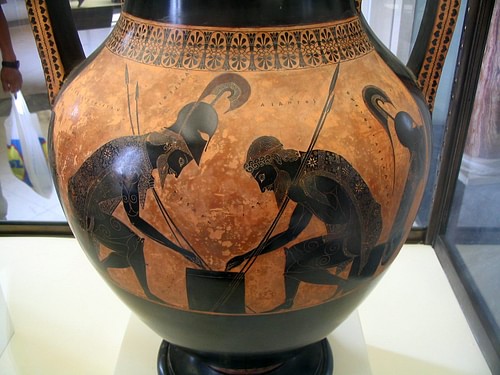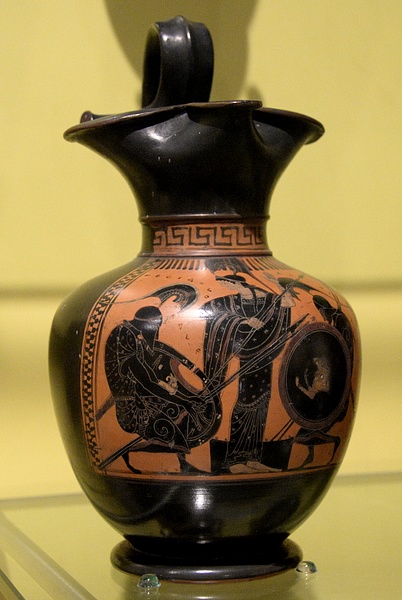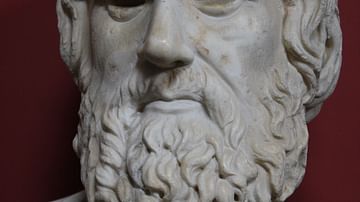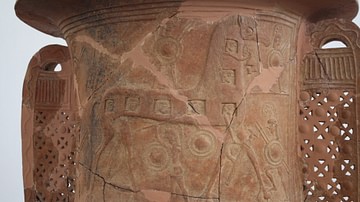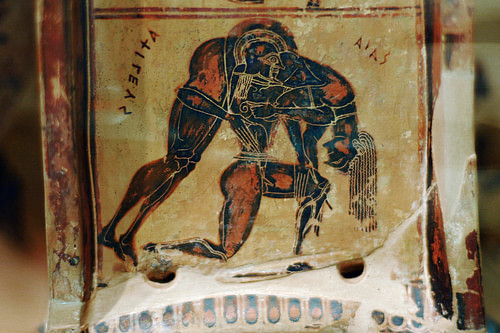
Ajax is a play written by the 5th-century BCE Greek poet and dramatist Sophocles. Although Sophocles wrote at least 120 plays, only seven have survived. Of his surviving plays, the best-known is Oedipus Rex (Oedipus the King) - part of a trilogy on the tragic king along with Antigone and Oedipus at Colonus. The exact date when Ajax was produced is unknown, but most classicists believe it was probably written early in his career.
The play centers on a character from Homer's Iliad - Ajax. In the final year of the battle between Athens and Troy, the greatest of the Greek warriors Achilles has been killed by the Trojan prince Paris. Odysseus and Ajax - also known as Greater Ajax - battle the Trojans to retrieve Achilles' body. Afterwards, an uncertainty arises over who is to receive the fallen warrior's armor. The ultimate decision comes down to a question of pride, and Odysseus is eventually awarded the prize. Ajax is incensed and goes mad, primarily due to the interference of the goddess Athena. Thinking they were his fellow Greeks, Ajax kills all of the cattle and sheep captured from the Trojans. When he regains his senses, he is devastated and commits suicide. A debate over his proper burial brings Odysseus to defend his friend's honor.
Sophocles
Sophocles (c. 496 BCE - c. 406 BCE) was born to a wealthy family in the suburb of Colonus outside the city of Athens. His long life coincides with a great period of Athenian grandeur. Besides being a tragedian, he was extremely active in Athenian public life, serving as a treasurer in 443-42 BCE and a general with the statesman Pericles in 441- 40 BCE. When he was in his eighties, he was named a member of the group of special magistrates assigned to the dubious task of organizing both financial and domestic recovery in 412-11 BCE after the disastrous Athenian defeat at Syracuse. He had two sons by his wife and one by his mistress. Two of them would eventually become playwrights. Of his 20 victories in play completion, 18 were at the Dionysia. Only two production dates of his plays are known: Philoctetus in 409 BCE and Oedipus at Colonus in 401 BCE.
Although active in Athenian politics, his plays rarely contain any references to current events or issues - something that makes the dating of his plays difficult. Classicist Edith Hamilton in her The Greek Way wrote that he was a passionless, detached observer of life. She thought the beauty of his plays was in their simple, lucid, and reasonable structure. He was the embodiment of what we know to be Greek. She wrote that "… all definitions of the Greek spirit and Greek art are first of all definitions of his spirit and his art. He has imposed himself upon the world as the quintessential Greek, and the qualities pre-eminently his are ascribed to all the rest" (198-199). Moses Hadas in his Greek Drama said that Sophocles represented humans as they should be while Euripides saw them as they were. Editor David Grene in his translation of Oedipus the King said that his plays had tightly controlled plots with complex dialogue, character contrasts, an interweaving of spoken and musical elements, and the fluidity of verbal expression.
Synopsis
The play begins with the Greek warrior alone in his tent, surrounded by the bloody corpses of dead sheep and cattle. He is ranting, bemoaning his plight. Outside the tent, the Greek hero Odysseus and the goddess Athena are speaking. Soon, Ajax exits the tent and addresses the goddess. Through a series of flashbacks, one learns that Ajax and Odysseus had fought the Trojans to retrieve the armor of the fallen hero Achilles. The question then became: who would be honored to receive the armor? The Greek commanders Agamemnon and his brother Menelaus decided it should go to Odysseus. Ajax went mad. This uncontrollable madness was due in part to Athena's meddling. The now insane Ajax, thinking he was killing the Greek commanders, slew, instead, the captured Trojan sheep and cattle. Having recovered his sanity and realizing his mistake, he is a threat not only to himself but also to others. His wife, Tecmessa, is worried about his safety as well as her own and that of their son.
Ajax's brother, Teucer, arrives hoping to keep Ajax in his tent and safe. Despite everyone's concern, Ajax escapes and commits suicide by falling on his sword. Now, another question presents itself: should he receive an honorable burial. Teucer and Agamemnon argue. Along with Menelaus, Agamemnon declares that Ajax acted alone and in self-interest and so his body should be left exposed to the elements and scavengers. Odysseus enters the conversation and makes a case for his one-time friend pointing out that Ajax was a great warrior and deserves an honorable burial. Reluctantly, Agamemnon gives in.
Cast of Characters
Among the short list of characters are:
- Athena
- Odysseus
- Ajax
- Tecmessa
- Messenger
- Menelaus
- Agamemnon
- Teucer
- Eurysaces
- a chorus of sailors
The Play
Outside the fallen city of Troy, Odysseus and the goddess Athena meet beside the tent of the crazed Greek warrior Ajax. She chastises the Greek commander Odysseus: "I'm always spying you on the prowl, Odysseus, seizing the chance to strike a blow at your foes" (74). Odysseus agrees; he has been tracking Ajax all night. Ajax had committed "the most astounding act" (74). The plundered sheep and cattle have been destroyed, slaughtered. He is pleased to see her and says: "It's you who have always guided me in the past and will guide me now" (75). Athena tells him that she is there to help, for the slaughter was truly the work of Ajax. She adds that it was the loss of Achilles' armor that drove him to the carnage; he believed it was the blood of the Greeks, in particular, Odysseus himself. However, it was Athena who had stopped him from truly killing Menelaus and Agamemnon as he stood outside their tent.
I threw a cloud of delusion over his eyes and so precluded his fevered joy side-tracking him on to the flocks and the undivided spoil of jumbled cattle the men were guarding. (76)
Despite the wishes of Odysseus, Athena called to Ajax to come out of his tent, darkening his eyes to avoid seeing his enemy, Odysseus. The still delusional Ajax greeted the goddess and promised to deck her temple with golden spoils. He proceeds to relay his story of how he turned his hands on the sons of Atreus. He tells her Odysseus was inside his tent in chains where he shall be lashed to death. After asking her to stand by his side, Ajax then leaves Athena and reenters his tent. The goddess and Odysseus part ways. As Odysseus takes leave of the goddess, he tells how he has pity for Ajax and is concerned for him.
After Athena and Odysseus leave, Tecmessa, Ajax's Trojan wife, enters from the tent. Speaking to the chorus (sailors of Ajax), she says:
…it was madness that seized our glorious Ajax and struck him with ruinous shame in the night. You can see him there, the sacrificed victims, butchered inside his tent. (82)
However, she reveals that he is no longer mad but now suffers a new agony.
The return to his senses has brought new pain, as the vision of ruin that's self-inflicted when no one's with you to share the blame, strains tight on the cable of torment. (84)
As he slowly regained his reason, he looked around "at the shambles inside the hut he pummeled his head and howled, then sank to the ground, a wreck amid the wreckage of slaughtered sheep …" (85). He was overwhelmed by remorse, even threatening her. As he gradually regained his sanity, he called for his son Eurysaces and his brother Teucer. Ajax bemoaned his plight and how he had flaunted his power over harmless beasts. However, the madness did not diminish hatred for the Greek commanders. He wished he could kill Odysseus, the sons of Atreus and then die himself. He speaks how if Achilles were alive and rewarded the prize of his armor it would be he, Ajax, who would receive it. However, the award went to an outright scoundrel. He speaks to his comrades who, he believes, remain loyal to him now that his mind had become unhinged. As he was about to kill Agamemnon and his brother, Athena struck him down. Now, what is to become of him? Upon a second request to see his son, the boy arrives with an attendant. Ajax tells the boy to cherish life and bring her mother joy. As the boy is ushered away, Tecmessa fears for her husband's life.
Later, Ajax exits his tent, carrying his sword. He slowly walks away, fearing for the life of his wife and son if he were to die. He hopes to go to the shore and wash away the stains and escape Athena's wrath. He tells himself that he will go and bury his sword and prays that Hades should guard it. After Ajax leaves his troubled wife, a messenger arrives at the tent. He is informed that Ajax has regained his senses and wishes to make peace with the gods. The messenger announces that Teucer has returned to camp. He has been told by the prophet Calchas to keep Ajax in his tent "if he wished to see his brother alive again" (100). Calchas spoke of the anger of the gods because Ajax had boasted that he did not need the gods' help to win a victory. However, Athena's anger would last only one more day. Ajax could still be saved. Tecmessa appears and is told of the prophecy. Fearfully, she informs them that Ajax is gone. Away from the tent, Ajax speaks aloud. While holding his sword, he prays to Zeus:
I beg of you Zeus and I also call on Hermes, guide of the dead beneath the earth, to put me fast to sleep when with a swift, unwrithing leap I've run my body through. (103)
He prays that the Furies destroy the sons of Atreus and spare not a single life in the whole Greek army. He then asks for death.
The scene changes. Tecmessa stands outside the tent and addresses the chorus. Her life is destroyed. Ajax lies in front of her, bleeding. She explains that he had fallen on his sword, but now she laments for her own future - what is become of her and her son? As Teucer enters he is told that before Ajax died he asked that his brother care for his son. Teucer grieves for his brother.
While Ajax used this sword which was Hector's gift to him in the fatal fall that he now destroyed him too, I, then, should say the gods contrived his death as they contrive all else for mankind. (110)
Menelaus enters and orders them to leave Ajax's body alone. The question at hand is whether or not Ajax is entitled to be buried honorably or left to the scavengers. He tells Teucer that when the Greeks arrived at Troy he believed Ajax was a friend and ally, but he proved to be a worse foe than all the Trojans. If the gods had not stopped him, they would all be dead. Ajax was both arrogant and self-willed. Teucer reminds the Spartan king that he has no right to govern over Ajax or discipline him. He says he will bury Ajax. Feeling threatened by Menelaus, Teucer challenges him to don armor. Menelaus leaves, but shortly, Agamemnon enters.
Teucer reminds the Greek commander that Ajax had once rescued him in battle from the Trojan Hector. As they speak, Odysseus enters. Agamemnon tells him that Teucer has been throwing insults at both of them. Odysseus responds that he can forgive a man who engages in violent words when he has been insulted first. Agamemnon tells Odysseus that Teucer refuses to allow Ajax to go unburied and will bury Ajax against his wishes. Odysseus says that even though Ajax was his sworn enemy after the awarding of Achilles' armor, he still respected him.
When a good and brave man dies, it can't be right to injure him; however, much you hate him. (120)
Agamemnon replies that a good man would listen to his superiors, but Odysseus responds that while Ajax was his enemy, he was once noble and deserves to be buried. The Greek commander submits, commenting that Ajax still remains a hated foe. In the final scene, Teucer orders a grave to be dug.
Summary
An old adage states that "pride cometh before a fall." In Sophocles' Ajax, the play's central protagonist Ajax succumbs to a wounded pride when Achilles' armor is awarded to Odysseus. As with many of the plays written by Sophocles and his fellow tragedians, the audience is conscious of the madness that overwhelms Ajax. Ajax cannot bear his humiliation and decides to kill not only the commanders Agamemnon and Menelaus but his fellow Greeks as well. Luckily for them, Athena intervenes, and Ajax only kills the captured sheep and cattle. Upon regaining his senses, Ajax is disgraced and commits suicide.
Tragedy abounds throughout the play. Not only does one feel some compassion for Ajax and his loss of pride but also for his wife who must be concerned for the safety of her husband, her son, and herself. If Ajax dies - honorably or not - she will be sold into slavery. Neither Agamemnon nor Menelaus is viewed as either heroic or noble. They rationalize their dislike of Ajax - choosing to let his body be food for the scavengers - but saying he was self-serving and untrustworthy. Norman F. Cantor in his Antiquity believes Sophocles' Ajax best demonstrates the playwright's concept of tragedy. Upon losing the armor, Ajax's pride is ruined, and, after regaining his senses, the realization of his actions drives him to take his own life. Cantor views Odysseus as a wise and just hero. Despite his dislike of Ajax and regardless of his crimes, he believes the fallen hero deserves an honorable burial.


